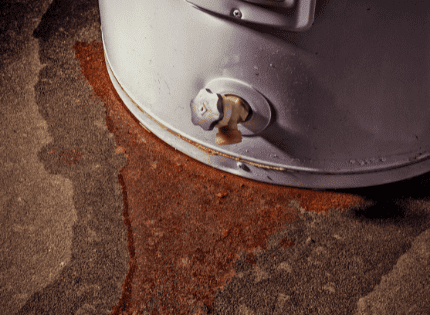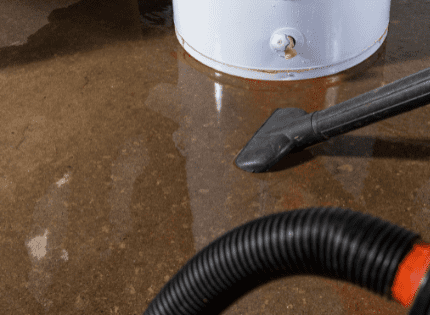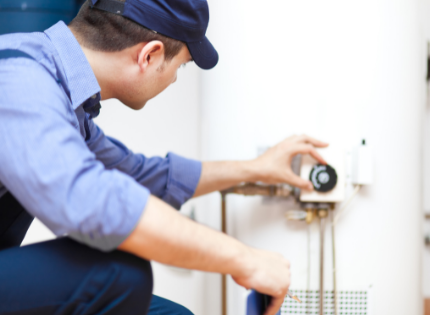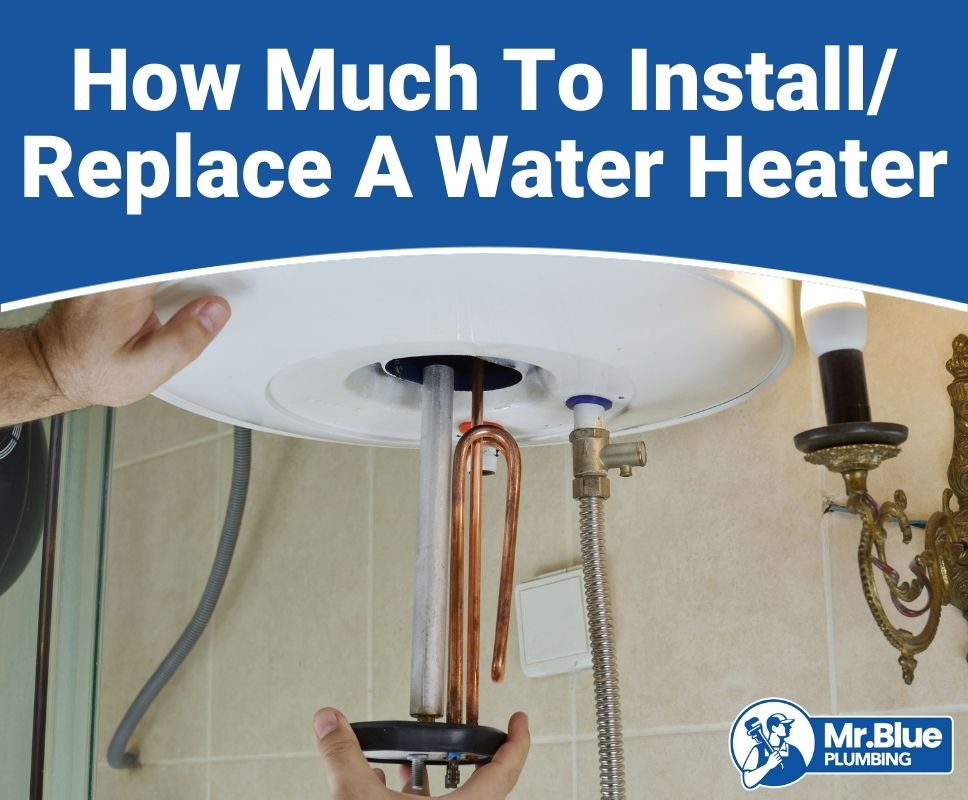Contents (Click To Jump)
- 1 What Is a Water Heater?
- 2 What Do You Need To Know About Installing a Water Heater?
- 3 How Much Does Installing or Replacing a Water Heater Cost?
- 4 What Are the Different Kinds of Water Heaters?
- 5 When Should You Hire A Professional To Install/Replace a Water Heater?
- 6 What Should You Look For In A Water Heater Installer or Repair Specialist?
What Is a Water Heater?
First of all, let’s talk briefly about what water heaters are and how they work so you get a better idea of what the installation process involves.
A water heater is a device that heats and insulates water for use throughout your home. It can use one of many different energy sources to heat the water, including natural gas, oil, and electricity.
Propane-fired and solar water heaters exist, but these are far less common.
Your equipment heats water for use in your domestic lines and plumbing fixtures that call for hot water. These include sinks, showers, and dishwashers.
Hot water is pulled from the top of the tank toward your fixtures, and fresh, cold water is drawn in through the intake tube near the bottom of the tank. When the cold water increases the temperature inside the tank, the heating element initiates to heat the water.

What Do You Need To Know About Installing a Water Heater?
Replacing your water tank or installing a new hot water heater can seem like a daunting home improvement task, and it is for most property owners and experienced DIYers.
Understanding how your water heater works, why and when it may need replacement, and how challenging the plumbing project can be to tackle yourself will help you understand the equipment and decide if you should hire a plumber for the job.
How Does a Water Heater Work?
Your water heater tank is highly insulated to help maintain the temperature of the water inside.
Near the bottom of the tank is an intake pipe, which draws new water from your water main when one of your fixtures calls for hot water.
The hot water rushes out the top of the water heater and toward your plumbing fixture.
The cold water gradually accumulates in the tank and brings the average temperature down significantly.
An underwater thermostat near the bottom of the tank – where the cold water will be most prevalent – identifies a dip in temperature and triggers the heating elements.
If you have a solar-powered or electric water heater, underwater elements will turn on to raise the temperature of the water. If you have an oil, propane, or natural gas water heater, the fuel will be pulled from the gas line and ignited by a pilot light to heat the water inside from underneath.
There are several safety measures included in your water heater, the most important of which is a temperature and pressure valve. If the temperature gets too high because of a malfunction or the water pressure gets too high for any reason, the valve opens and releases water onto the floor.
Most homeowners place a bucket beneath the valve to help collect water in the event of a pressure release.
Lastly, water heaters are equipped with an anode rod, which attracts corrosive elements to prevent the interior walls of the tank from corrosion and gradual weakening.
Check out the video below for a more in-depth explanation of how water heaters work:
Why Do Water Heaters Need to Be Installed or Replaced?
Some homes don’t have a water heater installed and instead rely on the boiler for all of the hot water needs. This is very inefficient and typically results in a lack of hot water during showers and washing as the boiler struggles to keep up with demand.
If you don’t have a water heater, it’s an excellent time to get one installed to make your home more efficient and comfortable.
As far as replacement of an existing water heater goes, you’ll have to look out for signs of equipment breakdown. There are many parts on and inside your tank that can degrade over time.
Corrosion of the metal surfaces inside the tank is one of the most severe problems. The inner wall is coated with a thin layer of glass to protect the insulated metal from corrosive materials in the water.

However, the glass shield doesn’t cover all metal surfaces and can crack with age, exposing more of the tank wall to corrosion. Your anode rod works to limit deterioration, but eventually, the metal walls will rust and break down.
The thermostat in the water heater needs to be very sensitive to function correctly, and it can easily lose its accuracy over time. This commonly leads to lukewarm water coming from your fixtures or frequent purging from the temperature and pressure valve.
Sediment naturally builds up in the bottom of your tank and can make it less efficient over time. Most water heaters include a drain valve that allows for routine maintenance, but many homeowners neglect their equipment until it breaks down and requires total replacement.
Finally, an old water heater is naturally less efficient and more likely to leak. The lifespan of a water heater is around ten years, so you should consider replacing your old unit if it has been in use for this long.
When Do Water Heaters Need to Be Replaced?
If you have a water heater installed already, there are several signs to look out for that can indicate a replacement is in order. Leaking of any kind from the connections or the tank itself is usually a good sign that you should replace the tank.
A professional plumber might be able to confirm that a part replacement would suffice, but generally, a leak means that the tank is badly damaged.
Water can also occasionally build up around your tank if it’s purged by the temperature and pressure valve.
This safety feature shouldn’t regularly activate, so if you find that your valve is frequently purging, you should consider replacing your system.
This is a sign that the thermostat inside the water heater isn’t functioning properly.
Your water heater should operate completely silently, except for the sound of a flame if you have an oil or gas-fired water heater. Any noises coming from the tank could indicate a problem and may require water heater replacement.
Your water will naturally corrode metal material inside your tank, which is a significant issue for the inner walls.
If you notice rust around any of the connections on the exterior of your tank or you have brownish water coming from your faucets and showerheads, it might be a good time to replace your water heater.
Finally, if your water heater at any point fails to heat water as expected or as it used to, you may need to replace it. Lukewarm or cold water from your water heater can indicate many different issues, including a faulty thermostat, corrosion, and a malfunctioning heating element or burner.
Is a Leaking Water Heater a Severe Problem?
Leaks from water heaters are seemingly insignificant most of the time, usually resulting in just a small puddle on the floor around your tank.
Some homeowners find water leaking directly from the tank, while others may notice trickling from the connections on the top of the heater. Any kind of leak should be taken very seriously, as it can cause significant property damage if left unrepaired.

Throughout the countless heating cycles and pressure changes your tank goes through, the metal encasing the water expands slightly over time.
As the metal expands, it changes how the connections and interior equipment fit and becomes more prone to leaking. If you find leaks from the connections themselves, the plumbing repair may be as simple as tightening them, or you could need a total replacement.
It’s near impossible for an untrained individual to confirm whether the issue is with the tank itself or the connections, so an experienced plumber should assess the heater if any leaking occurs.
A leak from a water tank usually starts small and progressively worsens with the heat and pressure cycles. Seemingly minor leaking could eventually cause significant leaks, leading to extensive water damage, rotting of your construction material, and an increased risk of mold growth and the resulting poor air quality.
Can You Install OR Replace a Water Heater Yourself?
Water heaters are complicated pieces of equipment, and installing and replacing them should be left to professional plumbers.
Very experienced DIYers might be able to install theirs accurately and hook up all of the plumbing connections and electrical wiring properly, but the risk of damaging your water heater – which can cost several thousands of dollars – is very high.
The minimal amount of money you’d save on labor costs performing a DIY installation pales in comparison to the damages you could cause to your equipment and your home if you make an error. It’s best to leave the work to a plumber and electrician.

How Much Does Installing or Replacing a Water Heater Cost?
The national average cost estimate to install or replace a hot water heater is around $2,000, including parts and labor.
One of the most significant factors when it comes to your water heater installation cost is the unit you choose to put in your home.
Standard tank storage water heaters and heat pump water heaters typically cost between $400 and $1,500, while high-efficiency tankless and condensing water heaters generally fall between $500 and $2,500, depending on the size and capability.
The more hot water you’ll need for your home, the larger and more powerful – and more expensive – the unit will be.
A 40-gallon tank will generally cost about two-thirds of a 50-gallon water heater, but it will provide significantly less hot water.
Additionally, the fuel source will affect your overall cost a bit. A solar tank will typically be the most costly, followed by an electric tank, a gas water heater, and finally one that is oil-fired.
In addition to the new unit cost, you’ll have to consider the labor costs involved in installing your water heater.
Most plumbers charge between $200 and $1,000 for this plumbing repair, while some have rates up to $2,000 for more complicated tanks or installations. This additional cost can be substantial, but it’s typically worth having an expert install your unit.
What Are the Different Kinds of Water Heaters?
There are four main types of water heaters, each of which uses a different method to heat water for the domestic lines in your home. We’ll discuss each of the styles below and provide some information on how they function.
Storage Tank Water Heater
Storage tank water heaters are the traditional style of heater, which is why we’ve described this style above. They’re usually large cylindrical tanks with pipes coming out the top to connect to your water supply and plumbing fixtures. As the name suggests, hot water tanks store water inside and apply heat as needed to maintain a suitable temperature.
Tank-style water heaters aren’t the most efficient because they heat water even when you aren’t using it. The insulative material around the tank helps keep the water warm, but it will continue to fire even if you don’t call for hot water from a fixture.
Tankless Water Heater
A tankless water heater – also called an on-demand water heater – doesn’t use a storage tank and instead heats water only as you call for it. These units are significantly smaller than storage tank heaters, and they’re often mounted on the wall rather than to the floor.
Tankless systems are very efficient because they don’t run their heating elements unless you need hot water. Provided you have the proper tankless unit installed for your needs and home size, you’ll have endless gallons of water suitable for showering and washing, and you’ll pay less on your utility bills. Unfortunately, the tankless water heater cost is generally the highest of all the styles.
Heat Pump Water Heater
A heat pump water heater pulls heat from the ground and the air to heat water in its tank. Rather than using electricity to run a powerful heating coil, it uses that energy to relocate heat from outside to your water.
Heat pump water heaters have the best energy efficiency and are typically the most affordable to run. They can supply ample hot water for your home in many cases with minimal energy costs, but they’re not suitable for colder climates where the heat from outside is insufficient to power the equipment.
Condensing Water Heater
A condensing water heater connects to the venting on your boiler and makes use of the heat generated by your furnace to heat your domestic water. When your boiler runs, heat is naturally lost to the exhaust, and condensing water heaters re-route that heat to a mechanism that transfers it to water in a tank.
This style of water heater is excellent for homes that are heated by gas or oil, and they’re generally very efficient.
When Should You Hire A Professional To Install/Replace a Water Heater?
If you don’t already have a water heater installed in your home, tying one into your existing plumbing system is rather complicated. You’ll have to shut off your water main, drain the domestic lines, cut into the copper piping, reroute the plumbing, and solder new pipes to your water heater.
This process would be too challenging, even for very experienced DIYers, so we strongly recommend you call in a professional plumber for help.
Additionally, many municipalities have building codes and regulations for the placement and installation of water heaters. Homeowners who do the job themselves may inadvertently install their equipment incorrectly, leading to the potential for code violations.
Replacing a water heater is significantly less challenging than installing one in a home that doesn’t already have one, but the job is still difficult. Water heater replacement will involve draining and cutting your domestic lines and soldering new piping to the new water heater.
Not only is the process complicated, but any mistakes can be very costly.
It’s not difficult to damage your new water heater during the installation process. Water heater repair or replacement can cost you hundreds to thousands of dollars, not to mention that damage units are more likely to leak and cause property damage. Improper connections and mounting can also lead to leaking.
A leaking tank can cause significant water damage to your home, on the order of thousands of dollars for a severe leak. Even minor leaks can cause mold growth, which is a health hazard to you and your family that necessitates expensive remediation.
What Should You Look For In A Water Heater Installer or Repair Specialist?
When you’re searching for a professional to install or replace your water heater, we strongly recommend choosing a master plumber. You would save money hiring a general contractor or handyman, but an experienced plumber is more likely to complete a proper installation, reducing the risk of leaking and damage to your expensive unit.
We also recommend that you choose a plumber who offers flat-rate pricing. Some may only provide hourly rates, but for a job with so few variables, you should be able to find a professional who confirms the cost upfront.
This will ensure you don’t overpay for long installation times and will give you the convenience of knowing your total cost before you commit.
Finally, we suggest hiring a plumber who provides a satisfaction guarantee or warranty for the work. This kind of promise not only tends to lead to a better experience for you, but it also gives you peace of mind that the work is being done properly.




